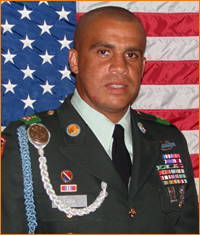2009 Soldier of the Year
winner

1SG Peter Lara
He is from Lakewood, Calif., and joined the Army in 1992.
FORT LEWIS, Washington - Fort Jackson, S.C. — To watch 1st Sgt. Peter Lara make the rounds of privates in his basic training company at 3rd Battalion, 13th Infantry, is to see how he brings soldiers into his trust.
As a gaggle of sweaty young trainees gathers in the shade around a private too overwhelmed by the heat to continue the exercise, Lara asks questions about the pale soldier, then tells the trainees about surviving in combat. He speaks quietly. He doesn’t boast.
His advice: Take care of your buddy and treat him with respect. Lara lives by his own advice and, by his own example, demonstrates how it’s done.
“He is about absolute, total selfless service — it’s never about Pete Lara,” said Col. Chuck Webster, formerly Lara’s battalion commander. “He is all about his men, about the Army and serving.”
“He gives his everything to soldiers,” said Shilo Lara, his wife of 19 years. “He mentors and directs them and makes sure they’re safe.”
Everything he does today, for soldiers and for himself, is colored by what happened to him in combat, when he was severely wounded.
Lara was three months into a deployment to Iraq on Nov. 19, 2005, when he and fellow soldiers of the 172nd Stryker Brigade Combat Team’s 2nd Battalion, 1st Infantry, were engaged in a fight in Mosul, Iraq, and under heavy fire in close combat. He had been designated a platoon leader.
Under close enemy fire, Lara was shot through the jaw , and shots disabled his weapon and pierced his arm. A bullet lodged in his head, but he didn’t realize it at the time. He was sure he would die.
“I could hear my jawbone crunching away in there and my teeth were broken,” Lara said. He reached into his mouth to clear the teeth and bone from his airway and kept fighting , pulling another soldier out of the enemy fire. Lara was losing blood but refused help even as reinforcements arrived, fearing other soldiers would be in danger.
For actions in the battle, members of his platoon received six Silver Star medals and one Distinguished Service Cross. Lara received one of the Silver Stars.
Since then, Lara has had 35 surgeries, one of them to remove the bullet from his head. He’s been diagnosed with post-traumatic stress disorder. He takes pills for pain and for traumatic brain injury. He reluctantly admits he’s been diagnosed with post traumatic stress disorder and confesses that when At the end of each day draws to a close he anxiously awaits morning because nNighttime brings fitful sleep, if any at all.
But he has recovered better than doctors predicted. A slight limp and a controlled grimace are the only physical signs of what he’s been through.
He refuses to use any of it as an excuse for giving up. He pushes himself through pain and strives to be an example of physical and mental excellence.
He has scored the highest on his unit’s physical fitness test, even though he was on medical profile, and he regularly goes out on the trail with his drill sergeants to support their training activities.
“My soldiers are still out there fighting and I’m just a dirtbag back here doing nothing. Being here is my way of giving back,” Lara told Army Times.
Part of that is being available to other soldiers, on duty and off. He and his wife have opened their home to dozens of soldiers over the years. “We’re one big family — anybody who needs help is welcome in our home,” Shilo Lara said.
He also stays in touch with almost everyone in his old platoon and, Shilo Lara said, has pushed some of them toward the help they needed.
“These are infantrymen — they refuse to see a doctor or a psychiatrist. It’s taken a long time to realize he needed help for himself and he tells the guys they need help to get through this,” she said.
An infantryman since he joined the Army in 1992 and a former drill sergeant, Lara had not known weakness before his wounds, his wife said. Now he’s trying to use that weakness to help others.
“He didn’t have that life experience of being weak. He was all about strength and perseverance. Now his guidance is more about his experiences in trying to survive, Shilo Lara said.“It’s still ‘go, go, go,’ but now it’s also ‘Look at me, I’m broken but I’m still the one to beat’.”
Lara extends his service beyond Fort Jackson. He played a key role in setting up Special Olympics events, encouraging hundreds of soldiers on post to donate their time at the event and help hand out medals.
He and his wife, who have three children and four dogs, are in the process of adopting a foster child, he said, “because people out there need help.”
“He’s a humble servant who really connects with soldiers and families,” Webster said. “Pete is able to touch people in ways that other people can’t.”
